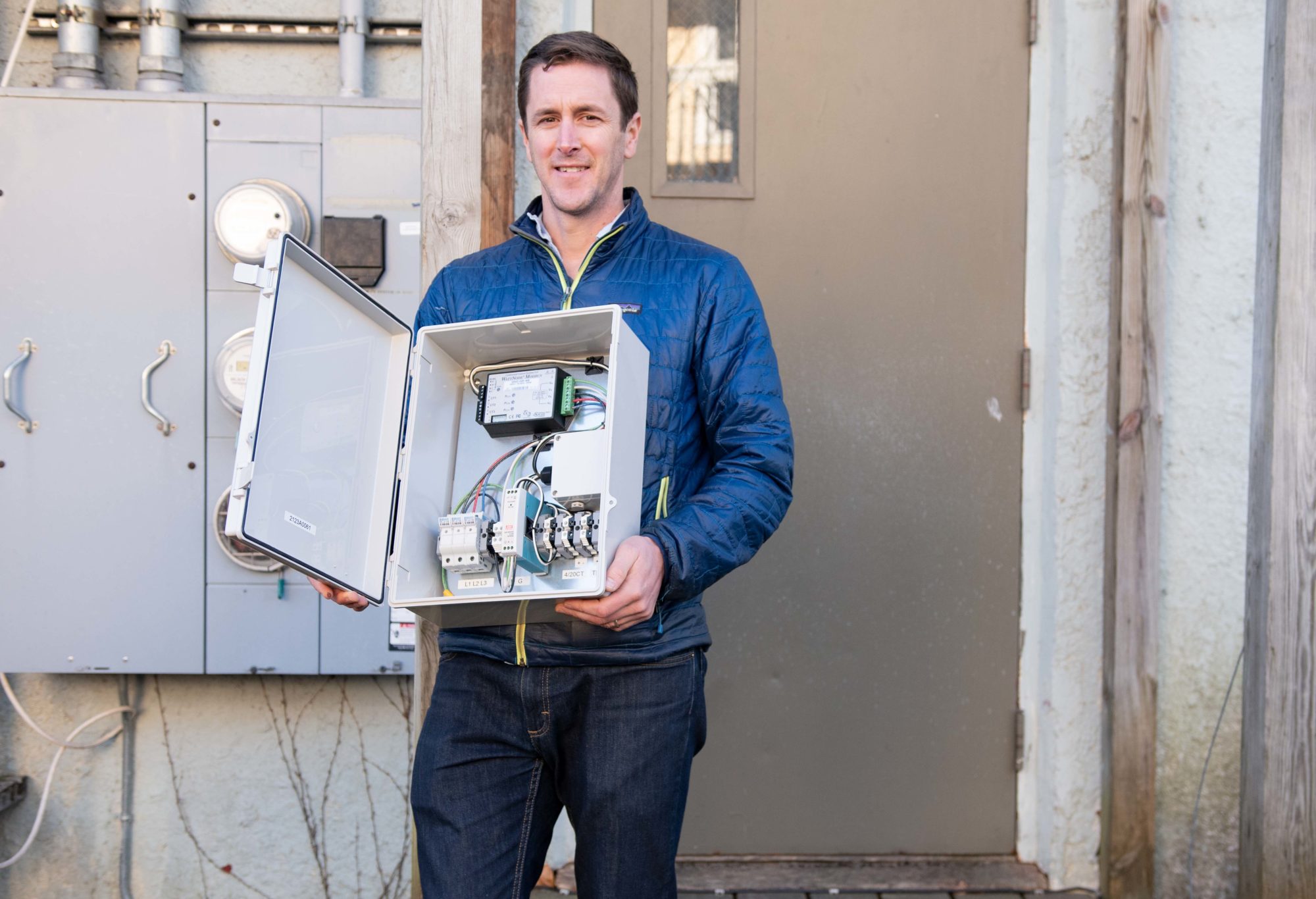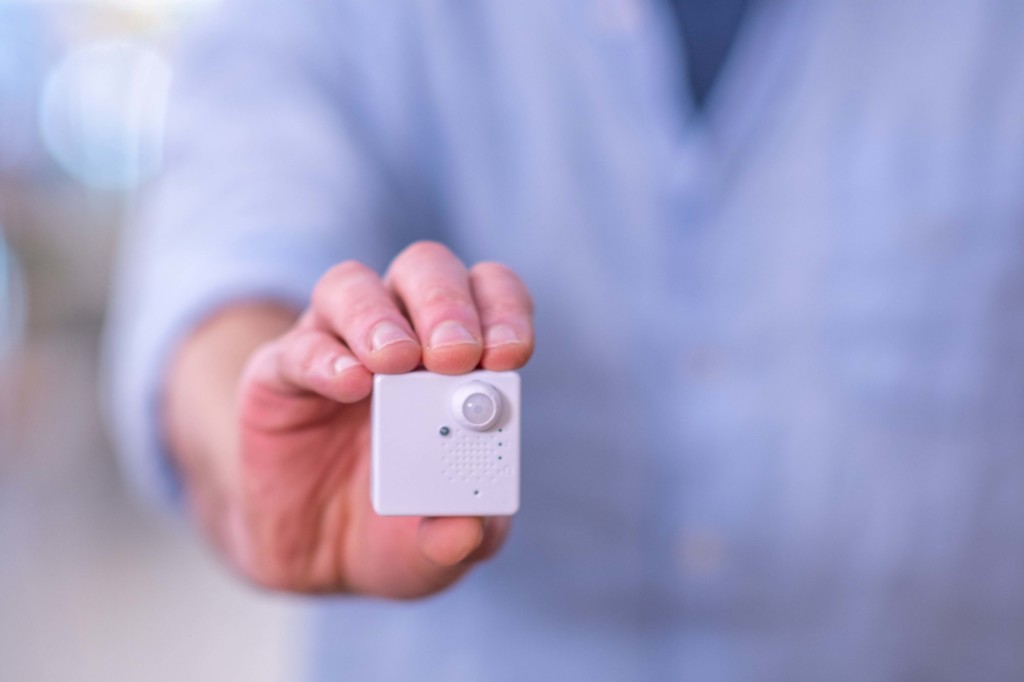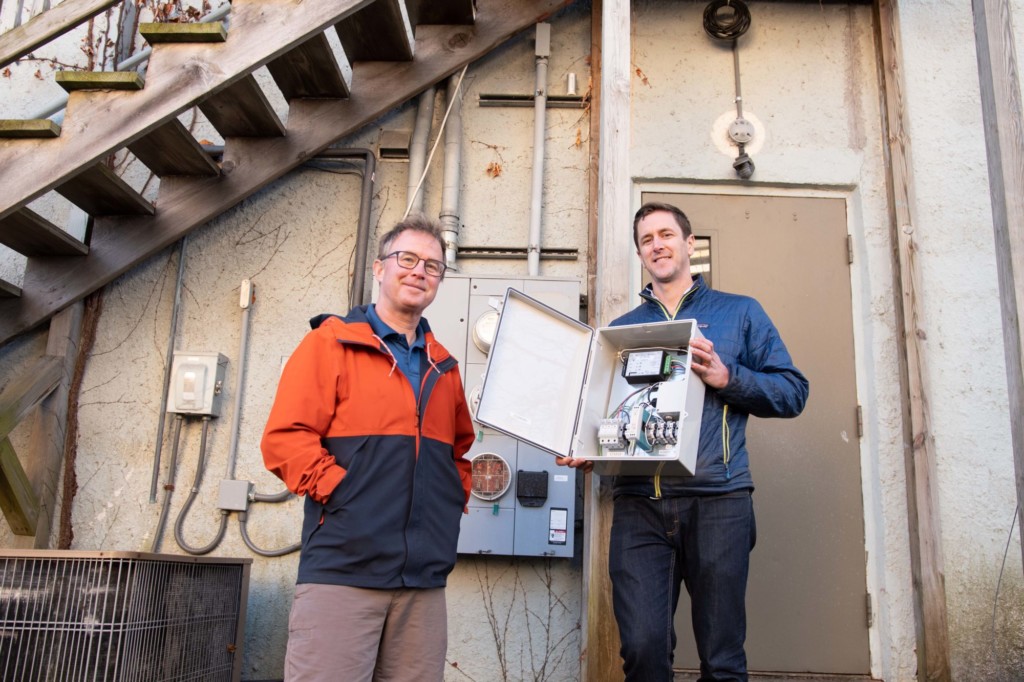DeltaClimeVT Founder Story: InfiSense Works to Decarbonize Buildings
March 30, 2022

Using wireless sensors, InfiSense provides easy-to-use data about building operations to help slow climate change.
The founders of InfiSense believe that generating better data will help save the planet. In the commercial building space, for example, cofounder Tim Guiterman says that real-time, accurate data points from buildings will help inform good decision-making around energy efficiency and reducing carbon emissions. With acknowledgement in recent years that the built environment is responsible for 40 percent of global greenhouse gas emissions, reducing the carbon footprint of buildings has gained urgency.
“There is directionally positive momentum around reducing the carbon footprint of buildings,” says Guiterman, “but how do we know which initiatives are working and what impact are they having on the people inside?”
The answer lies in better data, says Guiterman.
“It’s hard to get accurate, relevant data out of buildings. How do you measure how much energy lights are using? Are there people using the space when the equipment is on? If you want to understand if a building is operating efficiently, you need data beyond simply knowing if the building’s meter is running.”
The process of gathering that data and translating it into useful points of information has traditionally been “time-consuming, expensive, prone to failure, and sometimes impossible,” said Guiterman. “Many buildings don’t have centralized controls, let alone centralized monitoring and require multiple in-person visits by experts using ‘data loggers’ to gather information.”

InfiSense leverages wireless sensors that transmit data via Low Power Long Range Network, also known as LoRaWAN, a relatively new alternative to cellular and WiFi that wirelessly connects devices to the internet and communicates with network gateways. Photo by Erica Houskeeper.
Guiterman and his partner, Martin Bures, founded InfiSense specifically to address these challenges. “Our goal is getting real-time, simple-to-use data to the cloud and into meaningful analytics tools and dashboards,” said Guiterman.
Small bits of data, long ranges.
InfiSense designed a platform that enables rapid transmission of data using a new wireless communications standard called the Long Range Wide Area Network. Also known as LoRaWAN or just LoRa, the alternative to cellular and WiFi wirelessly connects devices to network gateways. The advantage of LoRa is that, using sensors, it can send small bits of data over long ranges and use very little battery power, often lasting 5-10 years. The InfiSense platform translates data into a simple interface so that it can easily be used to create spreadsheets, populate dashboards, validate programs, and inform decision-making.
InfiSense leverages wireless sensors that transmit data via Low Power Long Range Network, also known as LoRaWAN, a relatively new alternative to cellular and WiFi that wirelessly connects devices to the internet and communicates with network gateways. Photo by Erica Houskeeper.
The sensors are small, easy to install, and can collect limitless amounts of data from a building. Most do not require any hardwiring or complicated installation; they can be mailed to a building manager and installed in minutes. The sensors can be used to monitor a specific piece of equipment, such as an HVAC system, or placed in multiple places inside or outside a building to collect various points of data—from energy use to air quality to occupancy—that provide a more comprehensive picture. “It really depends on the building owner’s objectives,” said Guiterman.
Building a business model.
One of their earliest customers was Green Mountain Power (GMP), who connected with the company through the DeltaClimeVT accelerator program in 2020. A sponsor of DeltaClimeVT, GMP tried the company’s technology with a group of about 10 customers to learn more about how heat pumps and their temperature controls perform during peak energy use times. GMP partners with customers to share energy through batteries, car chargers and heat pumps during peak use times on the grid, which helps to reduce power costs for all GMP customers.
“DeltaClime was our first stab at understanding the business model side of things,” said Guiterman, whose background is in building systems engineering. “The program did a great job of helping us tell our story and communicate to investors, and the pilot with Green Mountain Power was incredibly valuable.”
“We’re excited to help DeltaClime grow innovation, and this is important as Vermont continues to lead the nation in energy transformation to serve customers as we address climate change,” said Graham Turk, Innovation Champion at Green Mountain Power.
That first pilot led to additional projects in Vermont and around the country. AJ Rossman, a building owner in Burlington, Vermont, used the sensors to monitor air quality of his building during COVID-19. The sensors collect data on temperature, humidity, and occupancy, and send alerts when a room is empty and ready to be cleaned.
AJ Rossman, left, and Tim Guiterman, stand outside of Rossman’s building in Burlington, Vermont. Rossman used Infisense sensors to monitor air quality of his building during COVID-19. The sensors collect data on temperature, humidity, and occupancy, and send alerts when a room is empty and ready to be cleaned. Photo by Erica Houskeeper.

AJ Rossman, left, and Tim Guiterman, stand outside of Rossman’s building in Burlington, Vermont. Rossman used Infisense sensors to monitor air quality of his building during COVID-19. The sensors collect data on temperature, humidity, and occupancy, and send alerts when a room is empty and ready to be cleaned. Photo by Erica Houskeeper.
On a much larger scale, InfiSense currently provides sensors to an energy efficiency company whose client, Con Edison, needs to verify to regulators that their investment in energy efficient HVAC and lighting improvements are delivering the savings promised—a process that would have required technicians to visit more than 200 buildings. “They just sent the sensors to the building managers,” said Guiterman, “and now all that data is being sent in real time to the cloud where it can be analyzed and presented back to Con Edison.”
A timely proposition.
These examples, says Guiterman, point to a trifecta of external factors that have influenced the young companies growth over the past two years.
First, in light of research showing that the built environment is responsible for up to 40 percent of global carbon emissions, there is a worldwide push to decarbonize buildings. Large corporations and businesses are working to drive their footprint down, motivated by both social responsibility and government mandates.
Secondly, corporations are being held accountable for their environmental, social and governance (ESG) initiatives with increased monitoring and oversight to avoid greenwashing, requiring data to show the effectiveness of their initiatives.
And last, COVID-19 put emphasis on building health and air quality. Even as many workers remain remote, buildings such as schools and hospitals, where people need to be together in-person, are looking for assurances that HVAC systems are working to keep air flowing.
“It’s a perfect storm for buildings,” said Guiterman. There is an unprecedented demand for real time monitoring, management, and tracking of data from buildings that ties that data to sustainability performance, financial performance, and the actual safety and comfort of a space through evidence.”
Though a small piece of the incredibly complex climate change puzzle, InfiSence’s idea has gained traction. The company was a national finalist of the CleanTech Open, one of the largest technology accelerators in the world. “The platform makes data readily available, easy-to-use, and simple to collect,” said Guiterman, “and will help reduce destructive emissions from the built environment.”
Read More Stories Like This:
- Refrigeration to Help Cool the Planet
- Slowing Climate, Change One Window at a Time
- Pilot Programs to Expand EV Charging in Vermont
- Buildings As Batteries?
- Compost for a Cleaner Planet
About DeltaClimeVT – A Climate Economy Business Accelerator
Managed by the Vermont Sustainable Jobs Fund (VSJF), the DeltaClimeVT business accelerator is a Vermont-based program serving startup and seed-stage ventures focusing on energy and climate economy innovation. The program provides an intense accelerated learning and business development process designed to test assumptions, expose and remediate business vulnerabilities, prepare for significant investment, and provide a platform for rapid scaling. As a proven leader in sustainability, Vermont offers participants access to a large number of entrepreneurial climate economy and energy experts throughout the program.




